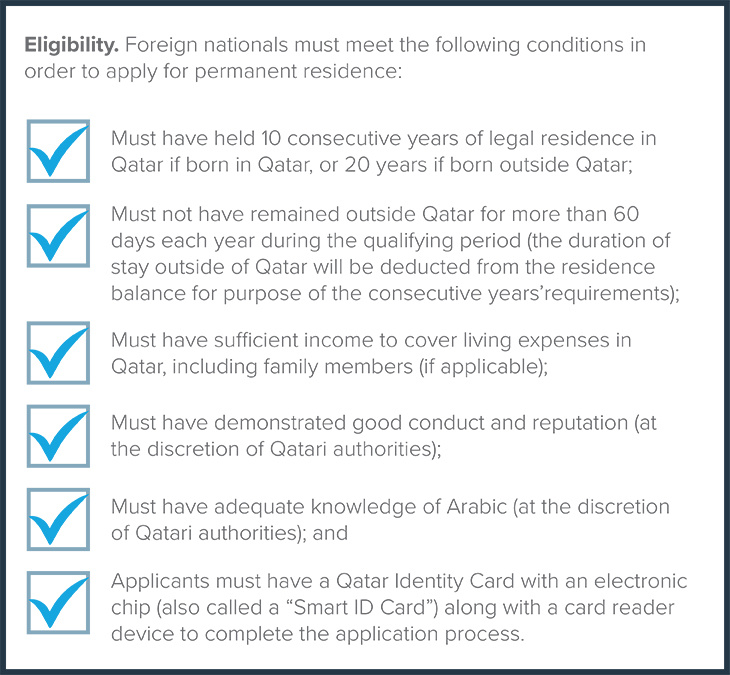Permanent Residency Introduced
April 17, 2019
At a Glance
- Qatar now allows foreign nationals with 20 years’ consecutive legal residence in Qatar and Qatari-born nationals with 10 consecutive years of legal residence in Qatar to apply for permanent residence. This is first Arab Gulf nation to allow permanent residency.
- Permanent residents will benefit from various rights including property ownership in select areas; free healthcare and education in government schools; and the ability to enter and leave Qatar without obtaining permission from their employers, among other advantages.
The situation
The Ministry of Interior (MOI) in Qatar will issue up to 100 permanent residence permits each year, which were not previously available to foreign nationals.
A closer look
Details on permanent residence in Qatar include the following:

- Exempt applicants. The categories of applicants referred to by Fragomen previously, including foreign nationals married to Qatari citizens and those completing great services to Qatar, are exempt from meeting the requirements applicable to other categories of permanent residence permit candidates.
- Application process. Foreign nationals can apply for permanent residence by completing the following steps:
- Applicants verify their eligibility on the MOI website by confirming whether they meet the residency condition above;
- The MOI invites eligible applicants to submit supporting documents (this includes a fee of QAR 3,000);
- A special committee reviews the applications and provides a recommendation to the Minister of Interior, who issues decisions;
- Successful applicants will be issued a Permanent Residence Card and will need to pay an additional fee of QAR 3,000.
Impact
- Additional benefits. Permanent residents will benefit from various rights including property ownership in select areas, expanded investment opportunities (including in real estate, previously restricted for foreign nationals), and free healthcare and education in government schools, among other advantages. They will also be given priority in the hiring process for government jobs.
- Travel restrictions lifted. Permanent residents will also be able to enter and leave Qatar without obtaining permission from their employers, which is currently required for all other foreign employees.
Background
- History of permanent residence program. Qatar previously offered foreign nationals long-term stays for up to three years (with the opportunity to renew their stay rights). Qatar’s permanent residence law was approved by the Amir of Qatar in September 2018 as part of the Vision 2030 program, which aims to attract more capital and increase foreign investment in the country.
- Other efforts to encourage immigration. The introduction of the permanent residence program is in line with Qatar’s vision to attract and retain talent by adopting legislation that facilitates long-term employment and residence in Qatar. Other notable changes demonstrating this policy are the introduction of the Wages Protection System in 2017, and the abolishment (for the most part) of exit permits in 2018.
- Permanent residence in other countries. Qatar's residency requirement for permanent residence is four or five times as long as the residency period of any other country. Jordan is the only other Middle Eastern country to offer permanent residency, however it is based on investment-related factors as opposed to residence durations.
Looking ahead
Qatar is the first Arab Gulf nation to allow certain foreign nationals to become permanent residents. Since permanent residence allows access to many in-country benefits typically only provided to citizens, the program is welcomed, thought the effects will be limited due to the restrictive cap of 100 permits per year.
Fragomen will report if the Ministry of Interior increases the quota for permanent residents and other relevant developments.
This alert is for informational purposes only. If you have any questions, please contact the global immigration professional with whom you work at Fragomen or send an email to [email protected].














